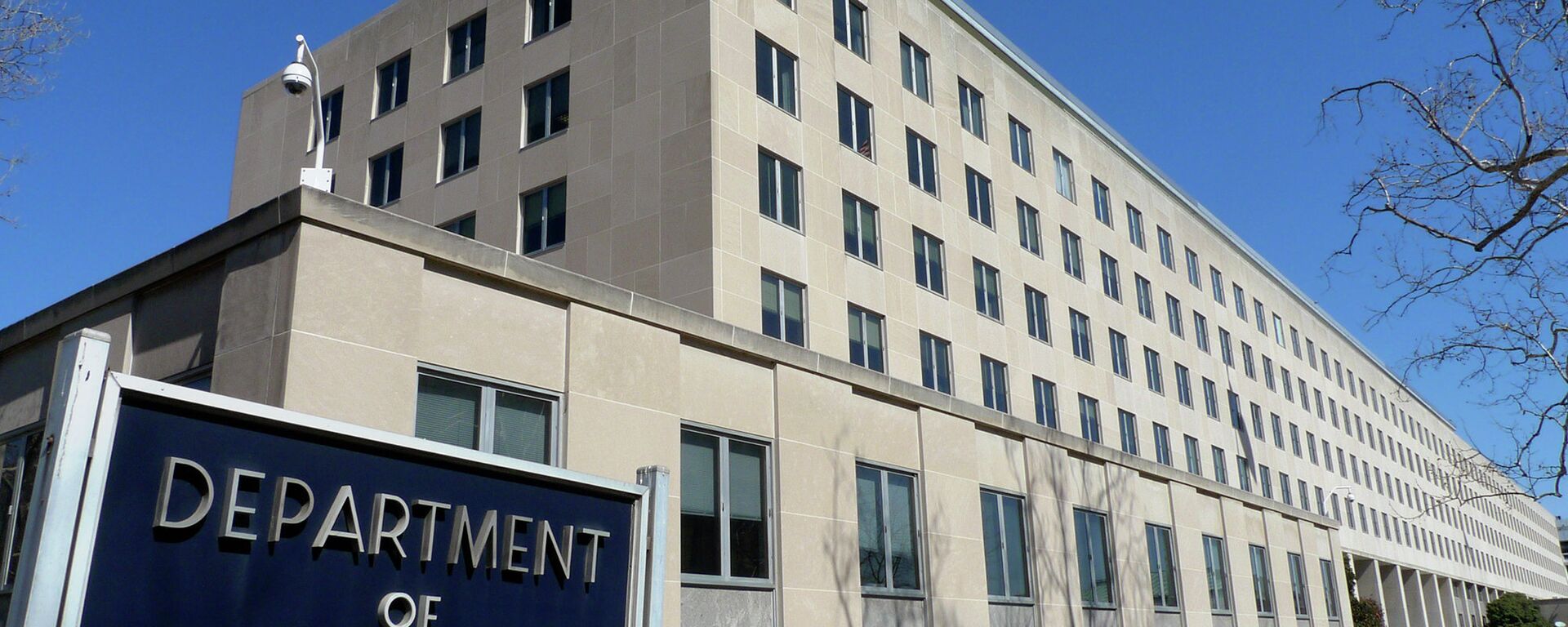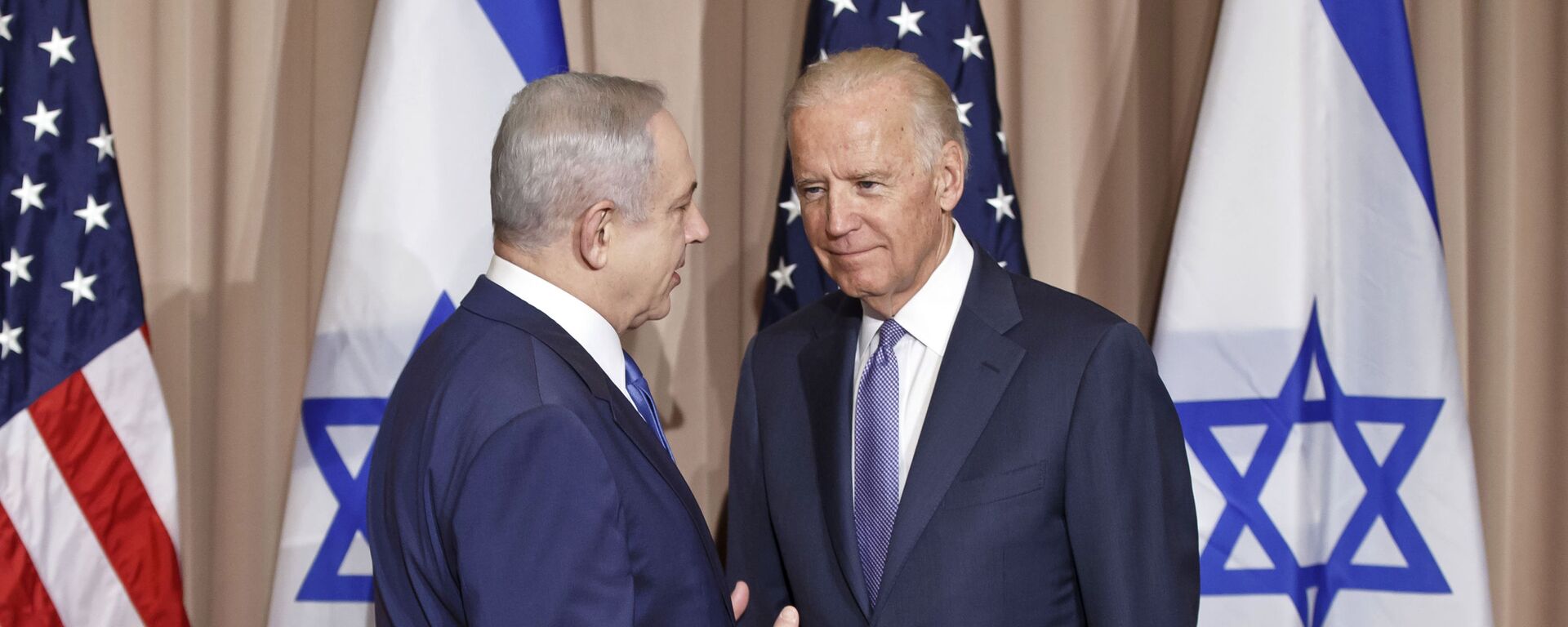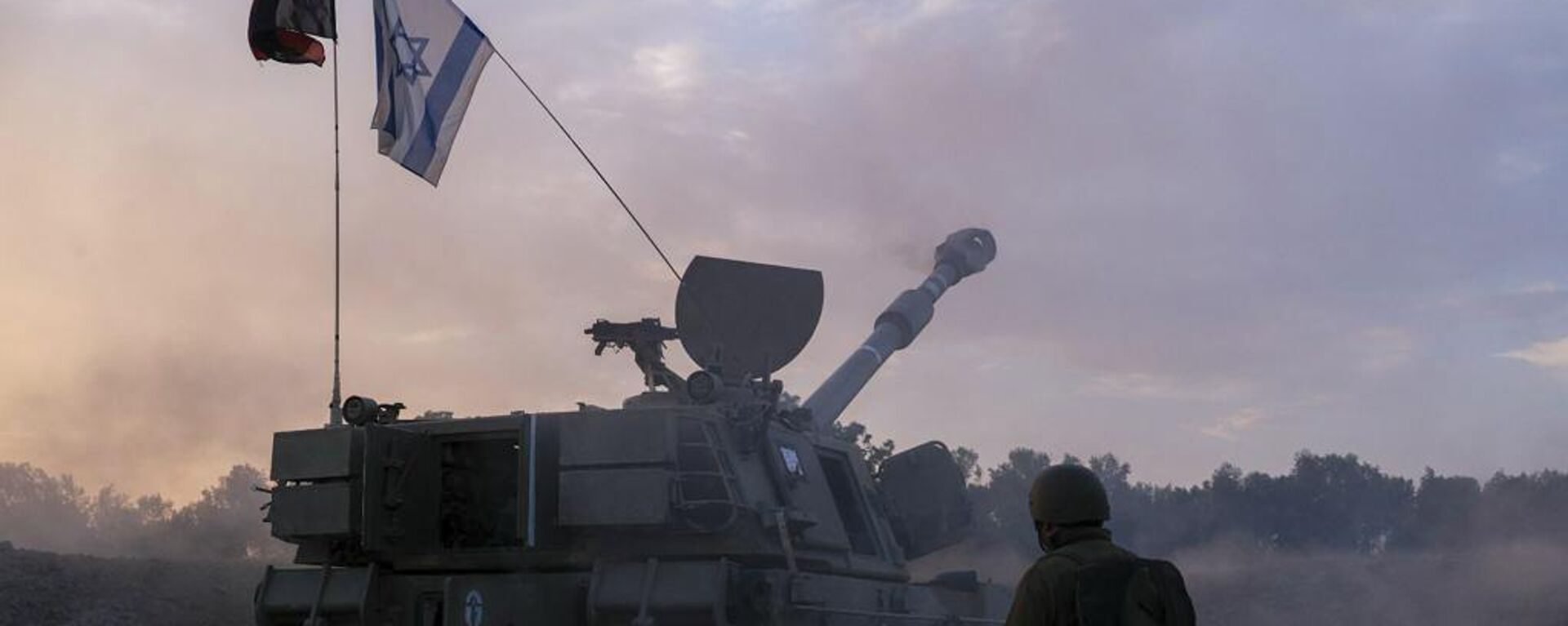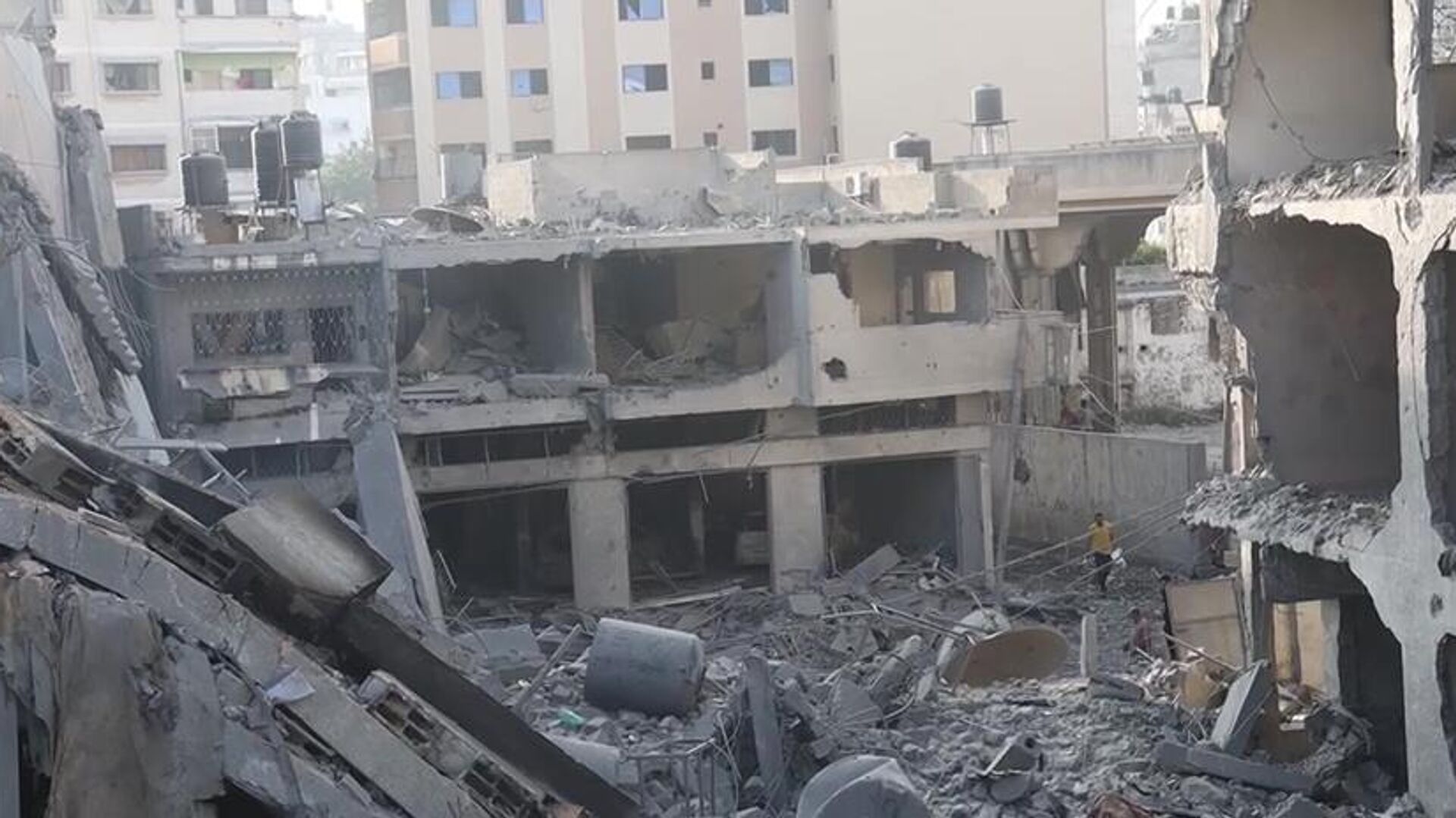https://sputnikglobe.com/20231113/gaza-war-mideast-players-gained-more-strategic-autonomy-less-respect-for-us-1114923656.html
Gaza War: Mideast Players Gained More Strategic Autonomy, Less Respect for US
Gaza War: Mideast Players Gained More Strategic Autonomy, Less Respect for US
Sputnik International
The US hit two sites allegedly linked to Iran in Syria on Sunday in response to a series of attacks on American forces in the Middle East, according to US Defense Secretary Lloyd Austin.
2023-11-13T13:25+0000
2023-11-13T13:25+0000
2024-01-30T10:27+0000
middle east
world
opinion
palestinians
joe biden
benjamin netanyahu
israel
iran
syria
hezbollah
https://cdn1.img.sputnikglobe.com/img/07e7/0b/0b/1114892285_12:0:837:464_1920x0_80_0_0_376735850b49803ef299194095d0e7a1.jpg
The latest US strike has become the third in a row of Pentagon attacks on presumably Iran-aligned militants in Syria in less than three weeks. Since the Hamas surprise October assault, US forces in the region have been repeatedly subjected to bombing. For its part, Washington has resorted to an unprecedented military buildup in the Middle East, concentrating warships, warplanes and manpower there under the pretext of "deterrence.""Obviously, the security situation in the Middle East is currently extremely precarious in the face of ongoing Israeli genocide and ethnic cleansing of Palestinians," Mehran Kamrava, professor of government at Georgetown University Qatar, told Sputnik.US retaliation strikes provoke further attacks from Shiite militias. On Monday Iraqi fighters launched drone attacks against two US military bases in Syria – one located near Al Khadra village and the Green Village base in the country's southeast – with the Islamic Resistance in Iraq claiming the responsibility for the strikes. Earlier on Monday, Al Mayadeen broadcaster reported that the US outposts in Conoco and in al-Shadadi had also come under fire.Washington's deterrence at least partially works, argues Major General Mahmoud Erdesat, researcher and expert in strategic affairs from Jordan. Per him, the US military buildup in the region is an "enough strong" message to Iran and Hezbollah. Nonetheless, he expects that the tit-for-tat game between Shiite militias in Syria and Iraq and the US military will continue.Everybody is sending a message to the other side, continued Erdesat, insisting that the presence of the US forces would discourage Iran, Hezbollah and other actors from broader military actions.'Greater Degree of Strategic Autonomy' in Middle EastHowever, there are obvious signs that the US no longer can dictate Middle Eastern players what to do, Kamrava noted, adding that Tel Aviv is not following Team Biden's orders, either.The Biden administration is incapable of restraining Israel, too, the professor underscored. It reportedly took a lot of time and effort for the Biden administration to convince Israeli Prime Minister Benjamin Netanyahu to agree to put in place four-hour daily humanitarian pauses during its war on Hamas in northern Gaza. Likewise, after US Secretary of State Antony Blinken proclaimed that neither Israel, nor Hamas should exercise control over Gaza in the post-war period, Netanyahu publicly announced that Israel would demilitarize the region after the war and "continue to control security there."The extraordinary joint summit in Riyadh was especially remarkable as it saw Iranian President Ebrahim Raisi's trip to Saudi Arabia, which became the first such visit by an Islamic Republic’s head of state in more than a decade. The gathering rejected Israel's statement that it acts in "self-defense" and called for an immediate cessation of hostilities. Nonetheless, the participants of the meeting declined to approve Tehran's proposals to impose economic and political restrictions against Israel over its handling of the Gaza war. Likewise, calls by Algeria and Iran to cut already established ties with Israel (under the 2020 Abraham Accords, in particular) were rejected by the summit, playing their own games, having gained more strategic autonomy.
https://sputnikglobe.com/20231113/chaos-at-state-department-as-memo-blasts-biden-over-misinformation-on-gaza-war-1114922015.html
https://sputnikglobe.com/20231106/what-message-does-us-tomahawk-carrying-submarine-send-amid-gaza-war-1114768378.html
https://sputnikglobe.com/20231101/biden-reportedly-doubts-netanyahu-will-last-long-as-israeli-prime-minister-amid-conflict-1114652982.html
https://sputnikglobe.com/20231102/expert-gaza-war-hurts-israels-ties-with-arab-world-but-abraham-accords-wont-be-axed-1114665325.html
israel
iran
syria
palestine
Sputnik International
feedback@sputniknews.com
+74956456601
MIA „Rossiya Segodnya“
2023
News
en_EN
Sputnik International
feedback@sputniknews.com
+74956456601
MIA „Rossiya Segodnya“
Sputnik International
feedback@sputniknews.com
+74956456601
MIA „Rossiya Segodnya“
israel, hamas, palestinians, gaza, the gaza strip, gaza war, israel's right for self-defense, us military buildup in middle east, shia militias, iran-linked militias, iran, hezbollah, israel-hamas war, escalation of tensions in middle east, benjamin netanyahu, antony blinken, joe biden, arab league
israel, hamas, palestinians, gaza, the gaza strip, gaza war, israel's right for self-defense, us military buildup in middle east, shia militias, iran-linked militias, iran, hezbollah, israel-hamas war, escalation of tensions in middle east, benjamin netanyahu, antony blinken, joe biden, arab league
Gaza War: Mideast Players Gained More Strategic Autonomy, Less Respect for US
13:25 GMT 13.11.2023 (Updated: 10:27 GMT 30.01.2024) The US hit two sites allegedly linked to Iran in Syria on Sunday in response to a series of attacks on American forces in the Middle East, according to US Defense Secretary Lloyd Austin.
The latest US strike has become the third in a row of Pentagon attacks on presumably Iran-aligned militants in Syria in less than three weeks. Since the Hamas surprise October assault, US forces in the region have been repeatedly subjected to bombing. For its part, Washington has resorted to
an unprecedented military buildup in the Middle East, concentrating warships, warplanes and manpower there under the pretext of "deterrence."
"Obviously, the security situation in the Middle East is currently extremely precarious in the face of ongoing Israeli genocide and ethnic cleansing of Palestinians," Mehran Kamrava, professor of government at Georgetown University Qatar, told Sputnik.
"And there is an ever present danger that the war in Gaza would escalate: First to Lebanon, then to Syria, and then, by implication, Iraq and Iran. That's a very real possibility. The skirmishes seem to be part of a calculated move by Hezbollah, by Iranian proxies in Lebanon and in Syria to increase the costs of the ongoing war for the United States and to put therefore pressure on the US to then press Israel to end its onslaught of Palestinians in Gaza," Kamrava continued.
US retaliation strikes provoke further
attacks from Shiite militias. On Monday Iraqi fighters launched drone attacks against two US military bases in Syria – one located near Al Khadra village and the Green Village base in the country's southeast – with the Islamic Resistance in Iraq claiming the responsibility for the strikes. Earlier on Monday, Al Mayadeen broadcaster reported that the US outposts in Conoco and in al-Shadadi had also come under fire.

13 November 2023, 12:36 GMT
Washington's deterrence at least partially works, argues
Major General Mahmoud Erdesat, researcher and expert in strategic affairs from Jordan. Per him, the US military buildup in the region is an "enough strong" message to
Iran and Hezbollah. Nonetheless, he expects that the tit-for-tat game between Shiite militias in Syria and Iraq and the US military will continue.
"Whatever they are having now in terms of exchange of rockets, it's under control," the major general told Sputnik. "It is well known for both sides. There is a line they cannot cross. They don't want any side to cross. Hezbollah knows it can throw rockets 5 kilometers, 15 kilometers, and Israelis fire back, whether by aircraft or by guns, again, to the same distance inside Lebanon and inside Palestine. And in the east of Syria - the same thing. Iranian militias throw some rockets aimed at American bases, and then they come to retaliate by aircrafts."
Everybody is sending a message to the other side, continued Erdesat, insisting that the presence of the US forces would discourage Iran, Hezbollah and other actors from broader military actions.

6 November 2023, 16:12 GMT
'Greater Degree of Strategic Autonomy' in Middle East
However, there are obvious signs that the US no longer can dictate Middle Eastern players what to do, Kamrava noted, adding that Tel Aviv is not following Team Biden's orders, either.
"The regional security architecture has changed in a way that the United States is having a considerably harder time achieving its goals," Kamrava said. "We have seen a greater degree of strategic autonomy being exercised by America's traditional allies, such as the United Arab Emirates and Saudi Arabia."
The Biden administration is incapable of restraining Israel, too, the professor underscored. It reportedly took a lot of time and effort for the Biden administration to convince Israeli Prime Minister Benjamin Netanyahu to agree to put in place four-hour daily humanitarian pauses during its war on Hamas in northern Gaza. Likewise, after US Secretary of State Antony Blinken proclaimed that neither Israel, nor Hamas should exercise
control over Gaza in the post-war period, Netanyahu publicly announced that Israel would demilitarize the region after the war and "continue to control security there."

1 November 2023, 22:46 GMT
"As a result, countries like Saudi Arabia, United Arab Emirates, even Bahrain, are finding it extremely difficult to be very closely aligned with the United States under present circumstances," suggested Kamrava. "And although they have vetoed in the recent Arab League and the Organization of Islamic Cooperation [joint] summit [in Riyadh] breaking of relations with Israel, nonetheless, we see that there's a much greater degree of polarity and a certain desire to be strategically autonomous, or at least appear to seem more autonomous in relation to the United States."
The extraordinary joint summit in Riyadh was especially remarkable as it saw Iranian President Ebrahim Raisi's trip to Saudi Arabia, which became the first such visit by an Islamic Republic’s head of state in more than a decade. The gathering rejected Israel's statement that it acts in "self-defense" and called for an immediate cessation of hostilities. Nonetheless, the participants of the meeting declined to approve Tehran's proposals to impose economic and political restrictions against Israel over its handling of the Gaza war. Likewise, calls by Algeria and Iran to cut already established ties with Israel (under the 2020 Abraham Accords, in particular) were rejected by the summit, playing their own games, having gained more strategic autonomy.

2 November 2023, 15:52 GMT






